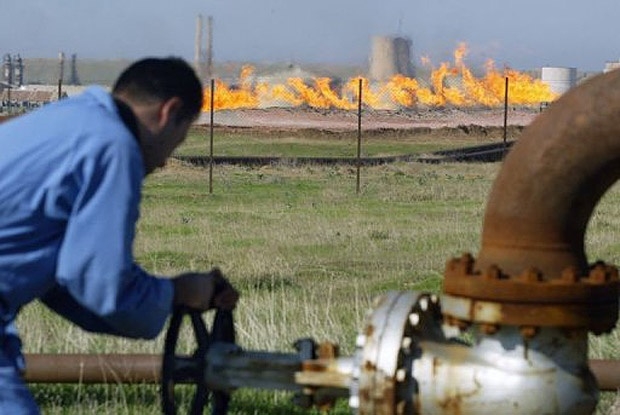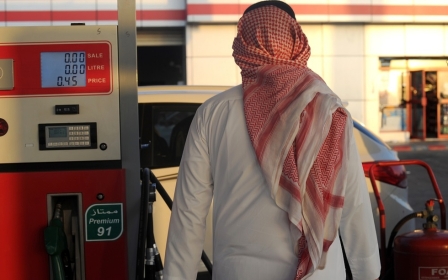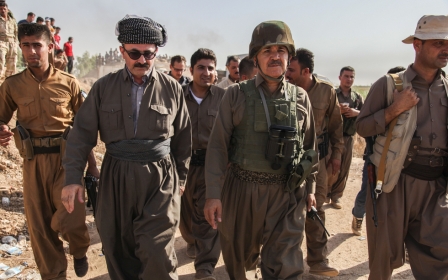ANALYSIS: Debt crisis exposes flaws in Kurdistan's economy

ERBIL, Iraq - The Kurdish Region of Iraq, long the darling of the international community as a result of its success in keeping the Islamic State (IS) group at bay and absorbing well over a million people displaced by the war, is in crisis.
While things are still going well on the battlefield, where the Kurds occasionally bite chunks of territory out of the self-proclaimed caliphate, the Kurdish Regional Government (KRG) is flat-out broke.
Salaries for public sector employees – including fighters holding the front line – are four months in arrears and have now been slashed. By its own account, the government is $16bn in debt.
This matters a great deal not only because the Peshmerga, as the Kurdish militias are known, are increasingly losing the will to fight, but because in Kurdistan almost everyone works for the government.
The Kurds have been lamenting their ill fortune, calling for international help to sustain their war effort and the cost of hosting 1.4 million displaced Iraqis and Syrian refugees.
The KRG hasn’t disclosed publicly how much money it wants, but have pointed to a February 2015 World Bank report that puts the costs of the refugee crisis at $1.4bn.
"It is the time for the international community and Iraqi government to come forward and shoulder their part of the humanitarian responsibilities by providing direct financial assistance to enable KRG to at least prevent the region from imminent collapse," reads a report released by the Ministry of Interior in January.
Self-harm?
But critics argue that there is little acknowledgement of the self-inflicted problems plaguing the Kurdish economy and the role the KRG has played in bringing about its own fiscal plight.
"The KRG is responsible for the fiscal crisis; its economic policy has been a failure," says Sarkawt Shamsulddin, co-founder of the Kurdistan Policy Foundation.
Compared to its obligations, the burden placed on the KRG by war and displacement is small.
The cost of running the war against IS, according to KRG spokesman Safeen Dizayee, amounts to roughly $100mn a year, in addition to the $1.4bn quoted by the World Bank that the KRG is paying out to cover humanitarian activities.
These figures put the total cost of the war and its humanitarian fallout at around $1.5bn a year, or about $125mn a month.
This outlay is compensated slightly by the thousands of displaced Iraqis that spend their Iraqi government salaries on housing and sustenance in Kurdistan, the local jobs created by the numerous foreign NGOs that work here, and the generous spending by its expat employees.
It is also a fraction of the debts owed by the KRG, not counting the salaries it still owes its employees.
Much of the fiscal mess is down to the ongoing dispute over Kurdistan's oil and the economy's dependence on hydrocarbon revenue.
Were the autonomous Kurdish region to fulfil its ambitions to cede from Iraq, it would be the very definition of a petro-state.
By its own account, 90 percent of government income is derived from oil sales, leaving the KRG exposed to the vagaries of the energy markets.
This over-reliance has left the government brutally exposed to the drop in oil prices, which have been heading south ever since Saudi Arabia decided to take on US shale oil producers in 2014. Over the past nine months, prices have declined further, and now hover around $34 a barrel.
The oil conundrum
The problem is compounded by politics. Ever since the Kurds kicked off an oil boom by signing the first contracts with international oil companies directly in 2007, the KRG and the central government has been at each other’s throats.
Baghdad rightly fears that an independent oil sector boosts the prospects of Kurdistan breaking away from Iraq and deprived the region of its share of the national budget for most of 2014.
As a result, the Kurds began selling oil independently of the central government, but Baghdad was successful in limiting this by threatening buyers with legal action.
An agreement to reinstate budget payments by Baghdad in exchange for Kurdish oil being sold via the state marketing company fell apart in 2015 and the KRG has since resumed its independent exports.
This leaves the government seriously out of pocket. According to the authoritative Iraq Oil Report, the KRG has to sell its oil at $10 per barrel below the price of Brent, as the dubious legal status of such sales entails a hefty risk premium as buyers risk getting sued.
After payments to oil companies, the government was left with revenues of only $330mn in January, less than half the monthly public sector payroll of $700mn, Patrick Osgood, Iraq Oil Report's bureau chief in Erbil, told Middle East Eye.
While Iraq Oil Report says that Baghdad’s budget payments to the KRG amounted to as much as $440mn each month, KRG spokesman Dizayee claims that the region never received more than $400mn a month, as the central government struggled with fiscal issues of its own.
But with the KRG’s borrowing options maxed out, the falling out with the central government also deprives the Kurds of access to the international debt markets. As a sovereign state, Iraq is able to borrow in a way the autonomous region is not, analysts say.
Since IS fractured Iraq's territorial integrity, the KRG's long-time president Massoud Barzani has been open about his ambition for an independent Kurdistan. But the government is now paying the price of using the economy to further this cause.
By antagonising Baghdad, the Kurds bet heavily that things would go their way. As the oil price shows no signs of recovery and with the public purse drained, this bet is a long way from coming off.
"The KRG’s economic policy has been a failure. It risked everything on one thing that it can't control, without understanding the challenges," said Shamsulddin.
Independence paradox
In its quest for independence, the KRG has put little thought into differentiating itself from the country it remains part of. Like the rest of Iraq, Kurdistan remains utterly reliant on oil revenues, and very little has been done to change that, say analysts.
"The KRG is now playing catch-up with its economy. It was not able to diversify the economy during the boom and now the region requires major reforms and hard decisions. Diversification should be a central pillar of future reforms," says Ahmed Ali, a senior fellow at the Institute of Regional and International Studies.
Such reforms are nowhere to be seen, critics say. Then as now, insufficient efforts are made to encourage growth in agriculture or food manufacturing, for example, despite the fact that the bulk of produce is imported from Turkey or Iran, while fields in Kurdistan lie fallow.
To make things worse, the private sector is largely owned by senior leaders of the two main political parties, the Kurdistan Democratic Party (KDP) and the Patriotic Union of Kurdistan (PUK), stymieing competition, said analysts.
Entrepreneurs looking to invest in Kurdistan have to be content with giving up stakes in their business to well-connected politicians, said Shamsulddin.
"The government has to create a private sector, but not one based on crony capitalism," said Shwan Sharey, a lecturer of economics at Ishik University in Sulaymaniyah.
"If the KRG had diversified its economy, maybe it wouldn't be in this situation. There would be some difficulties, but not like this."
A more mature private sector would not only have made the economy more resilient to falling oil prices, but also slimmed the bloated government bureaucracy, said analysts. But there appears to be little will among the ruling parties to ween the workforce off the public purse.
The KDP and the PUK, who have jointly ruled Kurdistan for the past decade, have developed a vast patronage network, offering cushy government jobs in return for political loyalty.
"This is a way to stay in power - everyone is employed by the government. When you have control over someone's salary, it's easy to say 'vote for me'," says Sharey.
In spite of widening strikes by public servants protesting outstanding pay and cuts to their salaries, this entrenched political system is resistant to fundamental reform, and will continue to stifle the economy while placing a heavy burden on the budget.
"Real reforms would need to restructure the system. There is no political will for radical change. They are just waiting for oil prices to rise, then they will go back to the same game," says Shamsulddin.
New MEE newsletter: Jerusalem Dispatch
Sign up to get the latest insights and analysis on Israel-Palestine, alongside Turkey Unpacked and other MEE newsletters
Middle East Eye delivers independent and unrivalled coverage and analysis of the Middle East, North Africa and beyond. To learn more about republishing this content and the associated fees, please fill out this form. More about MEE can be found here.




